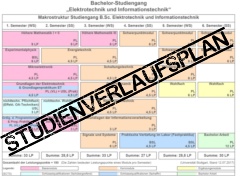Digital media have changed our society extensively over the last 20 years. Analog media and communication channels are now largely replaced by digital technologies (e.g. telephone, radio, television, newspapers, films and photography). This shift towards digitally networked media is taking place in the field of consumer electronics, but also to the same extent in the field of vehicles and machines. In order to fundamentally understand such systems and drive innovation, a comprehensive knowledge of computer science and digital media is required. A degree in media informatics provides in-depth knowledge and comprehensive skills to design these new digital systems to meet people's needs.
This course is based on the human-machine interface, but differs significantly from a media informatics course at a university. Our course is a computer science course with a focus on visualization and human-computer interaction - not media design.
The Study Choice Compass B. Sc. Media Informatics provides an additional overview over the study program.
The Media Informatics degree program combines the knowledge of computer science with that of digital media, human-computer interaction, computer graphics and digital networks. It thus provides the foundations that enable graduates to design digital systems in such a way that they meet the requirements of human users.
In the first three semesters, students learn the mathematical, practical and theoretical foundations of computer science and media informatics. Programming skills are acquired and consolidated. From the third semester onwards, these basics are deepened and expanded. Further compulsory subjects are provided for this purpose, as well as three elective catalogs in which you can select your own individual focus. In the study project, the acquired skills are applied in practice, thus creating a link to later professional activity in industry. In the elective area, you also have the opportunity to take an application subject worth up to 12 ECTS credits and thus specialize further for the professional world. At the end of your studies, you will be able to apply all the knowledge you have acquired and write your own scientific paper - the Bachelor's thesis.
Modules
The degree programme is divided into modules for which the credit points (ECTS). They will be asigned after passing the module examination or after passing all module partial examinations. Modules have a size between 3 and 18 ECTS. The modules comprise content-related courses and extend over one or two semesters at most.
Module handbook
Detailed descriptions of the individual modules can be found in the Module handbook of the respective degree program. However, since the module manuals of the individual degree programmes must be revised and, if necessary, updated every semester, you will find the current version of the module handbook of your degree programme for the current semester in the C@mpus system.
ECTS Credit Points
During the course of study, ECTS credit points have to be acquired by passing modules. The average number of ECTS credits per semester is 30. One ECTS credit corresponds to a workload of about 30 hours. ECTS credits are therefore a quantitative measure of the time required for the study. A total of 180 ECTS credits are required for the Bachelor of Science.
The formal requirements for the Bachelor's degree program in Media Informatics are the general university entrance qualification (Abitur) or a corresponding equivalent qualification as well as qualifying knowledge of German, as the main language of instruction is German.
In addition, English language skills have to be proven as well at least at level B2. Almost always the language level is mentioned on the school leaving certificate. Previous knowledge of programming is not required, but it helps to get started. Sound mathematical knowledge is particularly recommended in order to be able to follow the study contents adequately.
Since the change from school to university is often perceived as difficult, especially in the so-called MINT subjects (mathematics, computer science, natural sciences, technology), the University of Stuttgart offers both preparatory courses and semester-accompanying courses for support in these subjects. Information on this can be found on the pages of the MINT-Kolleg.
The degree program B.Sc. Media Informatics has a restricted admission (30 places). An application is only possible for the winter semester of each year. It takes place online via the C@mpus portal of the University of Stuttgart. Information and forms can be found in the application information of the Central Student Advisory Service. The complete application documents must be uploaded to the C@mpus portal by 15 July of each year. Paper documents are only required for enrollment.
Deadlines
for the winter semester: July, 15
for the summer semester: April, 15 (entrance into a higher semester only)
For all further information, inquiries, individual advice, etc., our student advisory service is at your disposal. For general application questions, the pages of the Registrar's Office will also help you.
The number of employees in the information and communication technology (ICT) sector is very large, and the rapid changes in the ICT sector require a highly qualified workforce in order to maintain innovative strength. Our graduates can take up employment in the areas of research, development, operation, project planning and sales, particularly in the following technical fields:
- Visualization and graphical interactive systems
- Web applications and interactive distributed systems
- Media systems, multimedia databases
- Design, implementation of media-related software systems
- Human-computer interaction
- Computer-aided communication and digital social networks
- Mobile devices, mobile media systems
- Game development and media production
- Development of interactive consumer electronics
- Development of e-learning systems
A good Bachelor's degree qualifies for a Master's degree program in Germany and Europe, especially for the Master's programs in the Department of Computer Science at the University of Stuttgart.
A Bachelor's degree is one of several prerequisites for an admission to a Master's program. Admission can also take place conditionally, i.e. previous to the successful completion of the Bachelor's degree. Currently, there are the following Master's degree programs in the Department of Computer Science:
- M.Sc. Informatik
- M.Sc. Software Engineering
- M.Sc. Artificial Intelligence and Data Science
- M.Sc. Computer Science (English program)
- M.Sc. Computational Linguistics (English program)
- M.Sc. Autonome Systeme (in cooperation with the Department of Electrical Engineering and the Faculties 4 and 7)
- M.Sc. Information Technology (English program; in cooperation with the Department of Electrical Engineering).
The four-semester Master's programme usually comprises 120 ECTS credits; its contents are research-oriented. The Master's degree is generally the prerequisite for a doctorate and further scientific work at the university or at any other research institution.
Ansprechpartner zum Studiengang Medieninformatik

Katrin Schneider
Dr.Program Manager, Department Manager & Erasmus Coordinator of the Computer Science Department
- Profile page
- +49 711 685 88520
- Write e-mail
- Hint: Due to the application processing the office is closed until 28.07.2025 (including).




